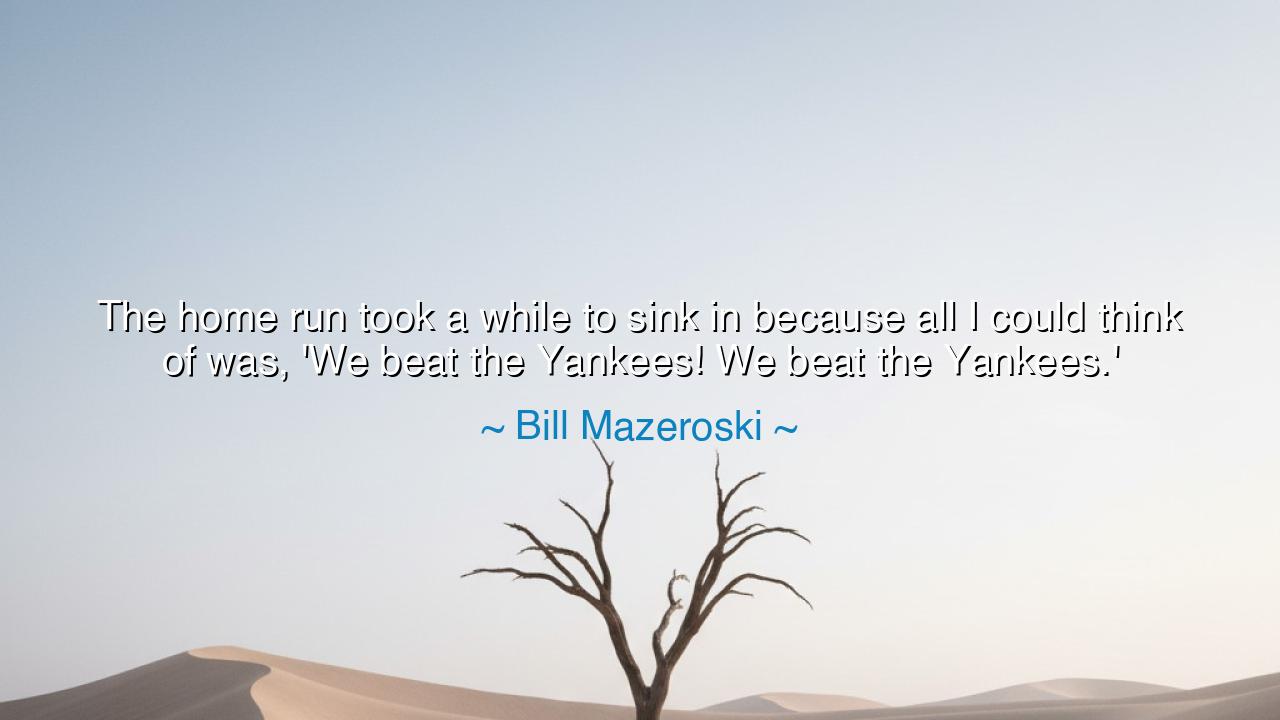
The home run took a while to sink in because all I could think of
The home run took a while to sink in because all I could think of was, 'We beat the Yankees! We beat the Yankees.'






When Bill Mazeroski said, “The home run took a while to sink in because all I could think of was, ‘We beat the Yankees! We beat the Yankees,’” he was speaking not only as a man who had achieved one of the greatest moments in baseball history, but as a warrior who had conquered the unconquerable. Beneath the excitement and simplicity of his words lies a deeper human truth — that in the instant of victory, it is not personal glory that floods the heart, but the overwhelming realization of what has been overcome. His words, humble yet powerful, remind us that triumph is sweetest not for the statistic, but for the struggle that preceded it, for the mountain that seemed too steep to climb.
It was October 13, 1960, when Mazeroski, the quiet second baseman for the Pittsburgh Pirates, struck the home run that would echo through eternity. The Pirates were not expected to win — their opponent, the mighty New York Yankees, were baseball’s empire, adorned with legends like Mickey Mantle and Yogi Berra. Yet in that ninth inning, with the score tied, Mazeroski swung his bat and sent the ball soaring over the left-field wall. In that single moment, he did what few dare to dream — he ended the World Series with one perfect swing. It was the first walk-off home run to win a championship, a strike against history itself. But when he spoke afterward, he did not speak of fame, or power, or personal achievement. He spoke only of joy — of the underdog’s triumph over the impossible.
To the ancients, this story would have been told as a legend of valor. For in every age, the tale of the small defeating the mighty stirs the soul. It recalls David and Goliath, the shepherd who felled a giant with a single stone. It calls to mind Leonidas at Thermopylae, whose courage in defeat inspired victory for future generations. Mazeroski’s home run was not merely a hit — it was a symbol, proof that greatness is not reserved for the powerful, but born in the hearts of those who believe. His cry of “We beat the Yankees!” is the cry of every man and woman who has stood before the impossible and dared to prevail.
There is humility in his words — a humility that speaks to the soul of true victory. Mazeroski did not bask in his personal glory, though history would have forgiven him if he had. Instead, his joy was shared, communal. He spoke as one voice for the city of Pittsburgh, for his teammates, and for all those who had ever been told they were not enough. His focus was not the self, but the collective triumph — the unity that makes victory meaningful. This humility, this self-forgetfulness in the face of greatness, is what the ancients would have called virtus, the strength of character that turns glory into grace.
Yet beneath his joy, there is also a lesson about perspective. When great things happen, they do not always feel real at first. “It took a while to sink in,” he said — a confession that even miracles need time to be believed. The human heart is slow to grasp the magnitude of its own victories. We are often so consumed by the battle that, when the war is won, we must relearn how to stand still. Mazeroski’s delayed realization mirrors that of every person who has fought long and hard for a dream — the moment when the weight of triumph is too vast to comprehend.
Consider Neil Armstrong, who upon stepping onto the moon, did not cry out for himself, but spoke humbly: “That’s one small step for man, one giant leap for mankind.” Like Mazeroski, he understood that the greatest victories are not about one person’s achievement but about the collective spirit of perseverance, courage, and hope that made them possible. When Mazeroski’s ball cleared the wall, it was not only his victory — it was Pittsburgh’s, it was baseball’s, it was humanity’s small reminder that even the smallest can stand among giants.
The lesson in Mazeroski’s words is timeless: rejoice in the victory, not for what it says about you, but for what it says about what is possible. Let your triumphs humble you, not inflate you. Celebrate not the fame of the moment, but the courage that brought you there. When you conquer your own “Yankees” — the forces in life that seem invincible — take a moment to marvel, to let it sink in. Remember that greatness is born not in those who never fall, but in those who rise with conviction and believe they can.
So let the words of Bill Mazeroski echo across time like the crack of his bat: “We beat the Yankees.” It is a declaration not of conquest, but of hope — a song of the underdog, a hymn to the power of belief. For in every age, there will be giants, and there will be those who dare to face them. And when you, too, stand before your challenge and prevail, may you remember his spirit — not boastful, but grateful; not proud, but amazed. That, truly, is the spirit of victory that never fades.






AAdministratorAdministrator
Welcome, honored guests. Please leave a comment, we will respond soon